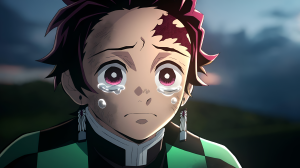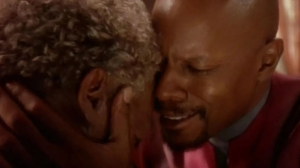The latest trailer for Avengers: Endgame says a lot more about the Marvel Cinematic Universe than it might appear on the surface. What it says, though, is not one of the various minor spoilers fans are likely combing over the footage to find right now. It is not who dies, or how they beat Thanos, or whether Thor and Captain Marvel are a thing (really, Twitter?). What the latest Endgame trailer really speaks to is what works about the MCU and its characters.
Videos by ComicBook.com
Part of what made Marvel Comics rise to the top in the Silver Age was that it embraced the shared universe principle that theoretically existed in DC Comics, but had not really been utilized effectively. Spider-Man tried out for the Fantastic Four, the Hulk fought The Thing, and so on. It created what has often been referred to as a kind of “soap opera for boys” — decades long, character-rich stories with tons of baggage that people can hop on and off at will, but which are driven largely by a core audience of obsessives who are along for the whole ride.
And that, in a lot of ways, is the Marvel Cinematic Universe after a decade of movies. That “ride” is why the latest trailer for Endgame is so emotionally effective, so visceral and exciting, even though it tells you virtually nothing about the movie that you didn’t already know.
Prior to Iron Man in 2008, the shared universe concept had never really been a factor in comic book movies. Yes, there might be a little wink-and-a-nod reference to a popular character in somebody else’s movie, but everything operated very independently.
(We aren’t even talking about the kind of semi-independence that DC is currently embracing, where the characters exist in the same space but rarely interact; before Iron Man, there was basically no shared space or interaction between IPs even in theory.)
The moment Samuel L. Jackson appeared to talk about the Avengers Initiative for the first time, there was a sea change in comic book movies. More than a second Iron Man movie, fans came out of the theater stoked for what other characters might pop up — and were not disappointed over the next 11 years.
Iron Man led to the next franchise which led to the next, which ultimately teamed up in Marvel’s The Avengers gave the shared universe of Marvel Comics a live-action corollary. The movies stand on their own (mostly), but reward repeat viewing, close analysis, and audience awareness of the other films. Think, for example, how much more nuanced Captain Marvel is if you know where Ronan and Korath will eventually end up, 20-ish years on, in Guardians of the Galaxy.
This phenomenon is not entirely unique to the Marvel Cinematic Universe; it exists in the Arrowverse as well, arguably even more, since there are so many more hours of content and such a deeper bench of characters to draw on and interact with. And there are other shared universes, even ones as modest in their stakes as Kevin Smith’s View Askewniverse (Clerks, Mallrats, Chasing Amy, Dogma, Jay & Silent Bob Strike Back, Clerks II).
The MCU itself is, though, a big part of why the Endgame trailer released today works — and, to a lesser extent, why the cliffhanger at the end of Avengers: Infinity War was so effective.
The Endgame trailer sees the world through the eyes of the shell-shocked Avengers, who have lost almost everyone and everything in the wake of Infinity War. It says very little about what the film will actually be about, and provides no “money shot” from a big action scene. It works specifically because of the decade-long relationships the audience have cultivated with these characters. Even when it is giving you basically nothing to work with, the trailer has an emotional impact because of the journey that the audience has been on with Steve Rogers.
The pain he is in resonates with the audience because the audience cares about him.
The first trailer, in which Iron Man shared his last words with Pepper Potts, had a similar impact: basic human empathy would have made his speech compelling if it were any random sci-fi movie, but the connection the audience has with Tony over the last decade-plus is what makes it truly heartbreaking.
It is a level of emotional investment that is almost impossible to achieve in the course of a single film, and it is symbiotic with the shared universe: that connection feeds the shared universe, making everything feel more connected, while at the same time only being truly possible because of the shared universe.
Recently, essayist and filmmaker Patrick H. Willems spoke to this phenomenon in a video which, ironically, is nominally about the limitations of the MCU. The video talked about the soap operatic elements of serialized storytelling less in terms of pure filmmaking and more in terms of the emotional impact it has on the viewer.
This is particularly visible in the closing moments of Avengers: Infinity War. Let’s take, for example, the death of Peter Parker/Spider-Man.
The Infinity War deaths work, to varying degrees, on everybody. There is certainly a significant chunk of the moviegoing audience who aren’t “keyed in” to geek culture and do not necessarily know what Marvel movies are and are not getting a sequel in the next few years. For those people, seeing is likely believing. If you went to see the movie in theaters, you probably heard some of those people shouting behind you during the Decimation or talking amongst themselves afterwards about how it was a “rip-off” that they killed Black Panther after just one movie.
(That’s a quote from my theater, yes.)
For that hardcore audience who has followed the MCU from the beginning (and who in most cases likely read at least some comics growing up), the impact was a little different. That segment of the audience knows who has a sequel coming up. They know that these deaths are, for the most part, almost certainly temporary.
The Russo brothers managed to work around that liability by playing to the emotional connection fans had to the characters.
Steve and Bucky share few meaningful scenes in Infinity War, but placing the two in close proximity to one another when Bucky was “dusted” gave fans a heartbreaking moment between the pair that resonated not because of what had happened in that film, but because of the long history between them developed across several prior movies.
The same thing with Peter Parker. Spider-Man has the very first MCU movie coming out following Endgame, and every fan with their finger on the pulse of the MCU knows that. Even some casual fans have likely seen set photos popping up on Twitter, since it has been in production for ages.
So armed with the absolute certainty that he will be coming back, how is it that Spider-Man’s “death” is the most heart-wrenching moment of all? Well, a lot of it boils down to the performance by Tom Holland, but beyond that, fans have had two films in the previous year or so — Spider-Man: Homecoming and Avengers: Infinity War — that basically revolved around the father/son relationship between Peter and Tony Stark. Pairing the two in Peter’s “final” moments, and playing it like they did, was a note-perfect manipulation of an audience who were already on board for that relationship.
Obviously, some of these things could have been possible in another franchise with more traditional sequels, like the Fast & Furious films or James Bond. It would be difficult, though, and it would be especially challenging for a franchise like that to develop such a broad base of characters to work with, who all felt important and empowered.
Avengers: Endgame is set to arrive in theaters on April 26th.
—–
Have you subscribed to ComicBook Nation, the official Podcast of ComicBook.com yet? Check it out by clicking here or listen below.
In this latest episode, we talk about the new Aladdin trailer, how the new Joker looks in the Harley Quinn show, a HUGE Captain Marvel discussion & so much more! Make sure to subscribe now and never miss an episode!








